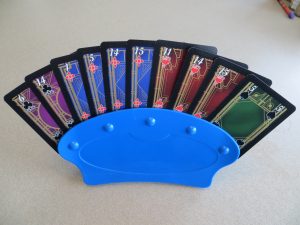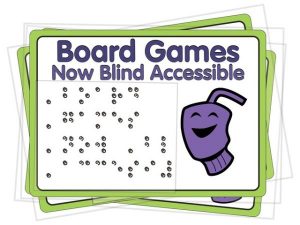Previously, I shared about my life as a caregiver for my wife who has multiple sclerosis. Recently, her ms has been causing increased challenges to our gaming together and as a family. The agility in her hands makes manipulating game components and holding cards difficult on some days, and she is not as quick-thinking as she used to be. This frustrates her and impacts her enjoyment of the games we play. As she and I walk the path of multiple sclerosis together, I have become much more sensitive and focused on accessibility in games. Back in August, I shared a guest post from Erin Hawley on Accessbility in Game Design. At the time, I really appreciated the article but did not feel the personal impact of it as I do now. As I watch my wife’s ms progress and the challenges she experiences, I am much more passionate about accessibility as it impacts gaming. This has become even more pertinent as I prepare to teach Game Studies this Spring. I will definitely be discussing with the students accessibility in their game design.
My wife and I discussed this, and feel that being transparent about our personal experiences might help others better understand accessibility and gaming. For those of you who have family or friends with accessibility needs, I hope this will give you some insights into sharing and enjoying games with those individuals. For those of you designing games or assisting with their development as freelancers, perhaps these personal experiences shared will give you some insights in to how to make your games even better and more accessible to a larger audience.
Components:
 There are days where my wife’s hands are weak and occasionally tremble, which makes it difficult to hold anything. Trying to hold a hand of cards, roll dice, or move game pieces small distances can be very challenging. Last year I crafted a dice tray and bowls which make dice rolling much simpler for her. She doesn’t have to worry about the dice bouncing away from her and off the table. For Christmas this year, I purchased card holders which look to really enhance her gaming enjoyment. They let her organize and see her cards without having to hold them in her hands, which on difficult days can be weak and tremble slightly. Now, the cards are secure and available to her yet still hidden from the others playing the game. For games like Diamonds and Fluxx with lots of cards in hand, this card holder makes the game playable and more enjoyable. I am looking to build some tile trays like are in Scrabble for use in other tile laying games that we have so she doesn’t have to hold them in her hand but they can be standing in front of her.
There are days where my wife’s hands are weak and occasionally tremble, which makes it difficult to hold anything. Trying to hold a hand of cards, roll dice, or move game pieces small distances can be very challenging. Last year I crafted a dice tray and bowls which make dice rolling much simpler for her. She doesn’t have to worry about the dice bouncing away from her and off the table. For Christmas this year, I purchased card holders which look to really enhance her gaming enjoyment. They let her organize and see her cards without having to hold them in her hands, which on difficult days can be weak and tremble slightly. Now, the cards are secure and available to her yet still hidden from the others playing the game. For games like Diamonds and Fluxx with lots of cards in hand, this card holder makes the game playable and more enjoyable. I am looking to build some tile trays like are in Scrabble for use in other tile laying games that we have so she doesn’t have to hold them in her hand but they can be standing in front of her.
Dexterity:
As fun as dexterity games can be (like Rhino Hero and Flick ’em Up), we have learned to pass on those types of games. Even on good days, my wife struggles with delicate and precise movement with her hands. We accept there are just some games out there we cannot play as a family. Accessibility in game design does not require that every game be created for every person. As games are unique, disabilities are unique. As you look to purchase games or design games, just keep in mind the audience you are contemplating that game for. If someone struggles with fine motor control, then they will be frustrated by dexterity games and thus not interested in playing them. Now some games are not specifically dexterity games but can be frustrating as well. Colt Express, for example, requires the players to move small game components from one cramped rail car to another. For games like that, my wife and others with accessibility challenges can still enjoy the games as long as someone is the dedicated component mover.
Speed:
Much like my wife’s challenges with dexterity, speed games are a major challenge. She cannot move her hands nor react mentally as quickly. Now in many games, we can ignore the speed aspect and just allow extra time to play. We often just ignore the sand timers or are more forgiving if my wife takes extra time. In simultaneous dice rolling games, like Mint Tin Apocalypse, we would just convert the game to a turn based game with each person rolling once, look at the result, then roll again. Now, in games like Escape and XCOM – The Board Game where speed gives the game tension and is required, we choose not to play them. XCOM has a pause ability in its app, but then it penalizes you for delaying too long. You could play these games without the timers, but then the tension would be lost. As with dexterity games, we accept there are games with speed components we cannot alter and thus we choose not to play those games. Our encouragement to game designers, contemplate offering an alternate turn based mode of play in your speed games for those that cannot react quickly physically or mentally.
Memory:
Especially if we are gaming later in the evening, fatigue affects my wife which then impacts her memory more. Games that require remembering details or facts can frustrate her at those times. For many games, a simple pad of paper can enhance her game play. For others, we have a house rules we call the “Scars in the Brain Clause” which says at any time we can refresh my wife’s memory about a rule or detail. An example of this is the game of Hanabi. We love playing that cooperative card game, but if my wife sometimes cannot remember what clues she has already been given. We have bent the rules a little and agree as a family that anyone can remind Angie of clues previously given in the game already, repeating them and pointing at the cards again. We offer similar repeated clues and details in games like Spector Ops and Codenames, or allow her to write down her own thoughts for references.
Vision:
 Vision impacts size of text, colors, and size of components. My wife’s vision is where her Multiple Sclerosis first impacted her and it still causes her issues with double vision and color issues at times. When game components are similar in color like a dark blue and purple, or deep orange and red, she can struggle to differentiate the pieces. For color blind people, like some of our friends, color choices in game components can really impact them. 64oz Games has a great write up for color blind accessibility for game designers. 64oz Games also offer accessibility kits for games, Braille accessories, and Braille dice. Text size also impacts my wife significantly. Games with lots of small text on cards really frustrate her so she tends to prefer games with larger iconography or colors that signify what to do. Games like Sentinels of the Multiverse and Legendary Encounters frustrate her with all the text that must be read, where games like Quilt Show and Gravwell she really enjoys because of their large fonts, unique icons, and distinct colors.
Vision impacts size of text, colors, and size of components. My wife’s vision is where her Multiple Sclerosis first impacted her and it still causes her issues with double vision and color issues at times. When game components are similar in color like a dark blue and purple, or deep orange and red, she can struggle to differentiate the pieces. For color blind people, like some of our friends, color choices in game components can really impact them. 64oz Games has a great write up for color blind accessibility for game designers. 64oz Games also offer accessibility kits for games, Braille accessories, and Braille dice. Text size also impacts my wife significantly. Games with lots of small text on cards really frustrate her so she tends to prefer games with larger iconography or colors that signify what to do. Games like Sentinels of the Multiverse and Legendary Encounters frustrate her with all the text that must be read, where games like Quilt Show and Gravwell she really enjoys because of their large fonts, unique icons, and distinct colors.
Now you have a glimpse into our lives and how Multiple Sclerosis has impact our gaming. If you have further questions for my wife, Angie, or I, please feel free to ask them. Both of us will be watching the comments.



Thanks for taking the time to share your family’s experiences. I love that you list some tips and ideas for making games more accessible.
Our goal in sharing our personal experiences was to open up the discussion of accessibility in games. We hope our struggles and our solutions help others to enjoy games as well.